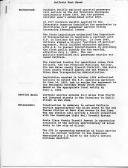
| Home | Open Account | Help | 277 users online |
|
Member Login
Discussion
Media SharingHostingLibrarySite Info |
Railroaders' Nostalgia > Mad Dog Chronicle # 175: The origins of CalTrainDate: 06/05/06 13:38 Mad Dog Chronicle # 175: The origins of CalTrain Author: mdo Mad Dog Chronicle # 175: The Origins of CalTrain
All during the time that I served as Assistant Superintendent in 1978 and 1979, as well as during most of my first six months as Western Division Superintendent, negotiations between the SP and Cal Trans continued. The SP's chief negotiator was its VPO, Alan DeMoss. The lead negotiator for Cal Trans was the District Director for District Four (Greater SF Bay Area) I was not present at the negotiations. However, I sure knew about them as I was constantly assembling facts and answering questions about operations and about costs. The negotiations had finally gotten started after the SP applied to the ICC for permission to abandon the commute service. The ICC examiner had ruled that absent an agreement with the local agencies to, at least, make up the operating deficit, SP could in fact abandon the service, thus trumping the intransigent California PUC. The Cal PUC had, for years, been thwarting SP's efforts to raise fares and or curtail service on off peak trains in an attempt to stem the out of pocket losses from operating the commute service. It was only after this ruling that the State and the JPB counties entered into serious negotiations with the SP. The three San Francisco Peninsula Counties that were served by the commute trains, San Francisco, San Mateo and Santa Clara, along with the local Cal Trans District office formed the SF Peninsula Joint Powers Board, or SF JPB for short. They reached an internal agreement on a funding split. That is, who would contribute what percentage to the operating deficit and to the cost of capital improvements. In June of 1980, an agreement which all parties could live with was finally reached. The JPB would make up the SP's operating deficit. ( Operating costs less fare box revenue) SP would continue to run the service, crew the trains, sell and collect the tickets, maintain the equipment, maintain the tracks, stations, maintenance facilities. and manage the service. A five member policy advisory board was created to set policies such as schedule changes, fare levels, and other service related issues. The Cal Trans District Four Director, Burch Bachtold would be the chairman of the group. Each of the General Managers of the county Transit Agencies would sit on this group. I was appointed as the SP representative. We would usually meet once a month at the Cal Trans District Four Offices at 150 Oak St. in San Francisco. I served as the SP representative on this committee from it's inception in July of 1980 until I was promoted to AVP Intermodal Operations in August of 1984. One of the most important elements of the agreement between the SP and the JPB was a compromise on liability. SP would continue to have the underlying liability. However the JPB would fund an insurance policy which would shelter the SP from most, but not all liability exposure. I should note, at this point, that liability for passenger train operations continues to be the major sticking point in almost every negotiation for new or even changed passenger operations everywhere in the US when Freight Railroad hosts are concerned. This is THE principal reason why it will be difficult to replace Amtrak for any existing intercity operation. As part of the agreement between the SP and the JPB, the JPB agreed to fund three management positions on the Western Division. A Manager of Commute Service, A mechanical Supervisor, and a Manager of Commute Budgets. You will note that after 7/1/80 there are four Assistant Superintendents shown on the Western Division Timetables. W T (Bill) Harral is the one paid for by the JBP. 6/5/06 mdo   |